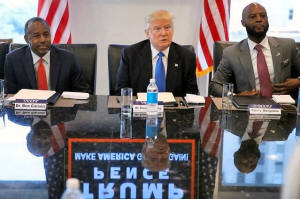|
Clinton attacks Trump's outreach to black
voters in new ad
 Send a link to a friend
Send a link to a friend
 [August 27, 2016]
By Emily Stephenson [August 27, 2016]
By Emily Stephenson
WASHINGTON (Reuters) - Democrat Hillary
Clinton called on Friday for voters to reject the "bigotry" of Donald
Trump's White House campaign, releasing a television ad criticizing his
efforts to appeal to black voters and saying she was reaching out to
people from all parties who are troubled by his candidacy.
The ad shows video of Trump's controversial pitch to black voters, in
which the Republican candidate urges them to support him by asking,
"What do you have to lose?" It also shows headlines about a racial
discrimination lawsuit the New York real estate mogul faced in the
1970s.
Clinton's presidential campaign said the ad, released a day after she
gave a speech accusing Trump of fueling America's "radical fringe,"
would air in the hotly contested states of Florida, North Carolina, Ohio
and Pennsylvania.
Polls give Clinton a wide margin over Trump among Hispanic voters, but
he is on a pitch to reduce her advantage by stressing he would create
jobs for all.
Trump pressed on with trying to broaden his appeal to minority voters on
Friday, as he met with Hispanic business leaders at his signature hotel
in Las Vegas.
"We've been doing very, very well with the Latinos. We’ve been doing
amazing, far, far greater ... than anyone understands. They want to see
jobs come in, we’re going to bring jobs. They want to see things
happen," Trump said.
He said the country's GDP growth rate of 1.1 percent in the second
quarter was not a good sign for the U.S. economy. "The country has some
very, very serious problems," he said.

Clinton, meanwhile, followed up on Thursday's tough speech by saying
that Trump's temperament and divisiveness made him unfit for the White
House.
"I am reaching out to everyone, Republicans, Democrats, independents,
everyone who is as troubled as I am by the bigotry and divisiveness of
Donald Trump's campaign," she told MSNBC, adding she was asking
"fair-minded Americans to repudiate this kind of divisive demagoguery"
at the Nov. 8 election.
Clinton attacks came during a difficult week for her campaign, as the
release of new emails from her time as secretary of state revived
criticism of her decision to use a private address and server rather
than a government one.
The emails also stoked scrutiny of her family's charitable foundation,
including accusations that major corporate and foreign donors gave money
in hopes of securing more access to then-Secretary Clinton. Her campaign
says no donors received any special favors.
Republican National Committee spokesman Sean Spicer told MSNBC Clinton
was only talking about Trump and race this week to deflect attention
from that controversy.
Trump countered her rhetoric on Friday by releasing a video showing
Clinton in the 1990s discussing a crime bill and referring to
"super-predators," or at-risk youth she said needed to be brought under
control. The video also shows U.S. Senator Bernie Sanders, Clinton's
main opponent in the Democratic primary this year, calling that phrase a
"racist term."
[to top of second column] |

Dr. Ben Carson (L) and Republican presidential nominee Donald Trump
(C) and Pierry Benjamin (R) attend a round table with the Republican
Leadership Initiative at Trump Tower in the Manhattan borough of New
York,, U.S., August 25, 2016. REUTERS/Carlo Allegri

CONTROVERSIAL STATEMENTS
In targeting what she terms Trump's bigotry, Clinton hopes to remind
voters of controversial statements he has made over the course of
the campaign. Those include describing some Mexican immigrants as
criminals and rapists, suggesting a judge could not be fair because
of his Mexican-American heritage, and proposing a temporary ban on
Muslim immigration to combat terrorism.
Trump has tried to sidestep these dust-ups by saying Democrats have
failed minorities with their economic policies, leaving them living
in poverty and attending failing schools.
Jennifer Hochschild, a professor at Harvard University who focuses
on race and immigration, said she did not think Trump could fix his
relationship with black and Hispanic voters.
"General cluelessness about racial dynamics will diminish any
possible black support that comes from Trump's emphasis on job
creation," Hochschild said in an email. "And Clinton has a lot of
deep roots among black politicians."
Trump also has been criticized for vowing to deport millions of
people living in the United States illegally. In recent days, he had
appeared to hold out the possibility of toning down his hardline
stance, although his precise plans on immigration have been harder
to pin down.
On Thursday, he denied he would loosen his proposed immigration
restrictions.
(Reporting by Emily Stephenson and Susan Heavey, additional
reporting by Ginger Gibson in Washington and Steve Holland in Las
Vegas; editing by Frances Kerry and Alistair Bell)
[© 2016 Thomson Reuters. All rights
reserved.]
Copyright 2016 Reuters. All rights reserved. This material may not be published,
broadcast, rewritten or redistributed.

 |